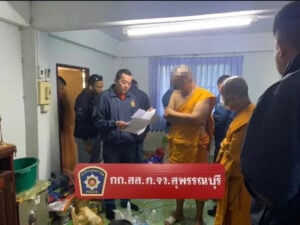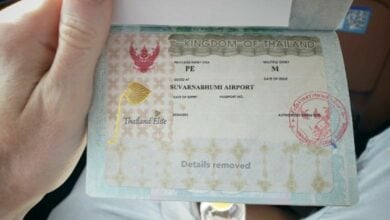Scams that can ruin your retirement plan in Thailand

Retiring in Thailand offers the chance to enjoy a vibrant lifestyle surrounded by culture and natural beauty. However, careful planning is essential to protect your financial security and avoid scams. Being aware of tax rules on retirement funds and staying cautious of unreliable visa services are important steps. This guide highlights common scams, the methods used by fraudsters, and practical ways to keep your retirement safe while making the most of your new life in Thailand.
Common retirement scams in Thailand

1. Pension scams
Pension scams are a growing threat to retirees, with 473 cases reported between March 2023 and March 2024. Scammers often use clever tactics, such as promising early access to pension funds, which is usually only allowed under special conditions like serious health issues. These scams can cause severe financial losses for those who fall victim.
The increase in pension scams highlights the need for retirees to stay alert. Fraudsters are getting better at targeting older adults, making it important to learn the warning signs. By staying informed and cautious, retirees can protect their savings and secure their financial future.
2. Investment fraud
Investment fraud is a common scam targeting retirees, often promising high returns that seem too good to be true. Scammers may offer guaranteed interest payments or claim investments will double quickly. Many of these scams are Ponzi schemes, where money from new investors is used to pay earlier ones. When new investments stop, the scheme collapses, leaving victims with serious financial losses.
Retirees should stay alert to protect their savings. Knowing the warning signs of investment fraud is key. Be cautious of offers that sound unrealistically good, as they often lead to financial harm. By staying informed and skeptical, retirees can better safeguard their retirement funds in Thailand.
Key Tactics used in retirement scams in Thailand

Scams targeting retirees in Thailand are a growing concern. Scammers use methods like phishing, online fraud, and fake financial advisors to take advantage of people and their savings. These tricks can cause serious financial losses, so it’s important to stay alert and informed. Knowing how these scams work can help retirees protect their money and secure their future.
Phishing and cyber fraud
Scammers in Thailand are increasingly using phishing and cyber fraud to target people, especially retirees. These scams often involve fake banking apps or online shops that trick users into sharing personal information. Around 55% of online shoppers in Thailand have fallen victim to these schemes. Scammers typically send fake links through SMS, leading victims to counterfeit websites that look real.
Thailand is a hotspot for phishing in Southeast Asia, making it important to stay alert. Cybercriminals often target those less familiar with technology, stealing money and personal data. Retirees should be cautious when clicking links or sharing information online. Staying informed about these scams is key to protecting finances and enjoying a secure retirement.
Unregistered financial advisors
Unregistered financial advisors are a common risk for retirees in Thailand. They often promise high returns in a short time, making their offers sound attractive. However, guaranteed returns are usually too good to be true and often signal a scam.
In Thailand, financial advice should come from registered institutions approved by the government. If an advisor offers unrealistic promises or is not registered, it’s a clear warning sign. Retirees should always research and choose trusted financial institutions to protect their savings. Staying cautious and informed is key to a safe and secure retirement in Thailand.
How to recognize retirement scams

Legal protections against scams in Thailand

Thailand has laws to protect consumers, including retirees who might face scams. Two key protections are consumer rights and cybercrime laws. These legal safeguards help ensure safety and fairness, making it harder for scammers to exploit individuals.
1. Consumer protection rights
Thailand’s Consumer Protection Act ensures fair treatment between consumers and service providers. It plays a key role in protecting consumers in the country’s fast-growing economy by preventing exploitation.
The law requires businesses to provide accurate information about products and services so consumers can make informed choices. It also ensures consumers can buy goods without pressure and guarantees their safety when using those products. If a product causes harm or damages, consumers have the right to seek compensation. This Act helps promote fairness and protect the rights of consumers in Thailand.
2. Role of Thai cybercrime laws
Thailand’s Cybercrime Laws protect retirees from online scams like identity theft, phishing, and fraud. These laws enforce strict penalties for cybercriminals, creating a safer environment for managing finances and making transactions online.
The Cybercrime Law offers retirees extra legal protection by holding scammers accountable. Knowing about these laws can help retirees feel confident when navigating the digital world and protect their retirement savings. With these measures, managing finances online in Thailand becomes more secure.
Steps to secure your retirement against scams

Protecting your retirement savings in Thailand requires careful steps to avoid scams. Here’s how to secure your retirement plan.
Check financial advisors and investments
Hiring a financial advisor can be helpful, but it’s important to confirm their legitimacy. Ensure the advisor or firm is registered with the proper authorities. Use tools like the Bank of Thailand’s license verification to check their credentials. Avoid advisors who promise unrealistic returns, as this is often a warning sign of fraud.
Strengthening cybersecurity
Be aware of online threats that can compromise your finances. Avoid suspicious links and use secure banking apps. Enable two-factor authentication for extra protection. Thailand’s Cybercrime Decree also helps monitor and freeze suspicious transactions, adding another layer of security.
By verifying advisors and improving online safety, retirees can protect their savings and ensure a secure financial future in Thailand. Staying informed and cautious is essential.
Retiring in Thailand offers an exciting lifestyle, but it’s important to plan carefully to protect your finances from scams like pension fraud, fake investments, and online fraud. Retirees should be cautious of unrealistic promises, unregistered advisors, and phishing scams. Thailand’s Consumer Protection Act and Cybercrime Laws provide legal safeguards, but staying alert, verifying advisors, and using strong cybersecurity measures are key to keeping your savings safe.
For those planning a secure retirement in Thailand, it’s also crucial to consider healthcare. Learn how to access quality medical care and maintain your health during retirement by exploring this guide on medical care tips for retirees in Thailand.
FAQ for scams that can ruin your retirement plan in Thailand
What common scams should retirees be aware of in Thailand?
Retirees should be cautious of pension scams, which promise early access to funds under false pretenses, and investment fraud, where scammers offer unrealistic returns that often lead to Ponzi schemes. Awareness of these scams is crucial to protect financial security.
How can I protect my retirement savings from scams?
To safeguard your savings, verify the legitimacy of financial advisors by ensuring they are registered with the appropriate authorities. Be skeptical of offers that sound too good to be true and strengthen cybersecurity by avoiding suspicious links and enabling two-factor authentication.
What legal protections are available against scams in Thailand?
Thailand has established legal frameworks, such as the Consumer Protection Act, which ensures fair treatment and accurate information from businesses, and Cybercrime Laws, which enforce penalties for online fraud and identity theft.
How can I recognize potential scams?
Key warning signs include unrealistic promises of high returns, odd pricing strategies involving round numbers, and pressure tactics that create a false sense of urgency. Communication red flags include a lack of transparency and avoidance of questions.

































